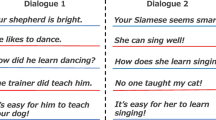Abstract
Transformer-based models, such as GPT-2, have revolutionized the landscape of dialogue generation by capturing the long-range structures through language modeling. Though these models have exhibited excellent language coherence, they often lack relevance and terms when used for domain-specific response generation. In this paper, we present DSRNet (Domain Specific Response Network), a transformer-based model for dialogue response generation by reinforcing domain-specific attributes. In particular, we extract meta attributes from context and joinly model with the dialogue context utterances for better attention over domain-specific keyterms and relevance. We study the use of DSRNet in a multi-turn multi-interlocutor environment for domain-specific response generation. In our experiments, we evaluate DSRNet on Ubuntu dialogue datasets, which are mainly composed of various technical domain related dialogues for IT domain issue resolutions and also on CamRest676 dataset, which contains restaurant domain conversations. We observe that the responses produced by our model carry higher relevance due to the presence of domain-specific key attributes that exhibit better overlap with the attributes of the context. Our analysis shows that the performance improvement is mostly due to the infusion of key terms along with dialogues which result in better attention over domain-relevant terms.
D. Kar—Work done during internship at IBM Research India.
Access this chapter
Tax calculation will be finalised at checkout
Purchases are for personal use only
Similar content being viewed by others
References
Blei, D.M., Ng, A.Y., Jordan, M.I.: Latent Dirichlet allocation. J. Mach. Learn. Res. 3, 993–1022 (2003)
Budzianowski, P., Vulic, I.: Hello, it’s gpt-2-how can i help you? towards the use of pretrained language models for task-oriented dialogue systems. EMNLP-IJCNLP 2019, 15 (2019)
Devlin, J., Chang, M.W., Lee, K., Toutanova, K.: BERT: Pre-training of deep bidirectional transformers for language understanding. In: Proceedings of the 2019 Conference of the North American Chapter of the Association for Computational Linguistics: Human Language Technologies, Volume 1 (Long and Short Papers), pp. 4171–4186. Association for Computational Linguistics, Minneapolis, Minnesota, June 2019. 10.18653/v1/N19-1423, https://www.aclweb.org/anthology/N19-1423
Forsythand, E.N., Martell, C.H.: Lexical and discourse analysis of online chat dialog. In: International Conference on Semantic Computing (ICSC 2007), pp. 19–26 (2007)
Keskar, N.S., McCann, B., Varshney, L.R., Xiong, C., Socher, R.: Ctrl: a conditional transformer language model for controllable generation (2019)
Kummerfeld, J.K., et al.: A large-scale corpus for conversation disentanglement. In: Proceedings of the 57th Annual Meeting of the Association for Computational Linguistics, pp. 3846–3856 (2019)
Li, C., Gao, X., Li, Y., Peng, B., Li, X., Zhang, Y., Gao, J.: Optimus: Organizing sentences via pre-trained modeling of a latent space. In: Proceedings of the 2020 Conference on Empirical Methods in Natural Language Processing (EMNLP), pp. 4678–4699. Association for Computational Linguistics, Online, November 2020
Lowe, R., Pow, N., Serban, I.V., Pineau, J.: The Ubuntu dialogue corpus: a large dataset for research in unstructured multi-turn dialogue systems. In: 16th Annual Meeting of the Special Interest Group on Discourse and Dialogue, p. 285 (2015)
Mohapatra, P., et al.: Domain knowledge driven key term extraction for IT services. In: Pahl, C., Vukovic, M., Yin, J., Yu, Q. (eds.) ICSOC 2018. LNCS, vol. 11236, pp. 489–504. Springer, Cham (2018). https://doi.org/10.1007/978-3-030-03596-9_35
Olabiyi, O., Vienna, V., Mueller, E.T.: Dlgnet: a transformer-based model for dialogue response generation. ACL 2020, 54 (2020)
Peng, B., Li, C., Li, J., Shayandeh, S., Liden, L., Gao, J.: Soloist: Few-shot task-oriented dialog with a single pre-trained auto-regressive model (2020)
Peng, B., et al.: Few-shot natural language generation for task-oriented dialog. In: Proceedings of the 2020 Conference on Empirical Methods in Natural Language Processing: Findings, pp. 172–182 (2020)
Peters, M., et al.: Deep contextualized word representations. In: Proceedings of the 2018 Conference of the North American Chapter of the Association for Computational Linguistics: Human Language Technologies, Volume 1 (Long Papers) pp. 2227–2237. Association for Computational Linguistics, New Orleans, Louisiana, June 2018
Radford, A., Narasimhan, K., Salimans, T., Sutskever, I.: Improving language understanding by generative pre-training (2018)
Serban, I., Sordoni, A., Bengio, Y., Courville, A.C., Pineau, J.: Building end-to-end dialogue systems using generative hierarchical neural network models. In: AAAI (2016)
Shrestha, L., McKeown, K.: Detection of question-answer pairs in email conversations. In: Proceedings of the 20th International Conference on Computational Linguistics. COLING 2004, p. 889-es. Association for Computational Linguistics, USA (2004)
Sordoni, A., Bengio, Y., Vahabi, H., Lioma, C., Grue Simonsen, J., Nie, J.Y.: A hierarchical recurrent encoder-decoder for generative context-aware query suggestion. In: Proceedings of the 24th ACM International on Conference on Information and Knowledge Management. CIKM 2015, pp. 553–562, Association for Computing Machinery, New York, NY, USA (2015)
Wen, T.H., et al.: A network-based end-to-end trainable task-oriented dialogue system. In: EACL, Valencia, Spain, pp. 438–449. Association for Computational Linguistics, April 2017
Wu, Z., et al.: A controllable model of grounded response generation (2020)
Yang, Z., Dai, Z., Yang, Y., Carbonell, J., Salakhutdinov, R.R., Le, Q.V.: Xlnet: Generalized autoregressive pretraining for language understanding. In: Wallach, H., Larochelle, H., Beygelzimer, A., d’Alché-Buc, F., Fox, E., Garnett, R. (eds.) Advances in Neural Information Processing Systems, vol. 32. Curran Associates, Inc. (2019)
Zellers, R., et al.: Defending against neural fake news. Neurips (2020)
Zhang, Y., et al.: Dialogpt: large-scale generative pre-training for conversational response generation. In: Proceedings of the 58th Annual Meeting of the Association for Computational Linguistics: System Demonstrations, pp. 270–278 (2020)
Author information
Authors and Affiliations
Corresponding author
Editor information
Editors and Affiliations
Rights and permissions
Copyright information
© 2021 Springer Nature Switzerland AG
About this paper
Cite this paper
Kar, D., Samanta, S., Azad, A.P. (2021). Meta-context Transformers for Domain-Specific Response Generation. In: Karlapalem, K., et al. Advances in Knowledge Discovery and Data Mining. PAKDD 2021. Lecture Notes in Computer Science(), vol 12714. Springer, Cham. https://doi.org/10.1007/978-3-030-75768-7_23
Download citation
DOI: https://doi.org/10.1007/978-3-030-75768-7_23
Published:
Publisher Name: Springer, Cham
Print ISBN: 978-3-030-75767-0
Online ISBN: 978-3-030-75768-7
eBook Packages: Computer ScienceComputer Science (R0)




